The Role of Vocabulary and Jargon in LSP Courses and Competence
VerifiedAdded on 2023/01/19
|12
|4251
|92
Essay
AI Summary
This essay explores the limitations of solely focusing on vocabulary and jargon within Language for Specific Purposes (LSP) courses in developing overall communicative competence in the workplace. The introduction emphasizes the importance of business discourse and its connection to business contexts. The essay argues that while vocabulary is crucial, it is not the only factor, and that over-reliance on jargon can be ineffective. The discussion covers the importance of spoken versus written vocabulary, the role of jargon, and the need for a broader approach to communicative competence. The author highlights the importance of various aspects of communication, including written and spoken discourse, and provides examples of how jargon can be useful but insufficient on its own. The essay concludes by suggesting that a holistic approach to language learning, incorporating various communication types, is essential for fostering effective communication in professional settings. The essay also touches upon the various aspects of business communication, including the importance of written and spoken discourse, and the role of textualization, organization and contextualization. The essay highlights the importance of business discourse and its connection to business contexts.
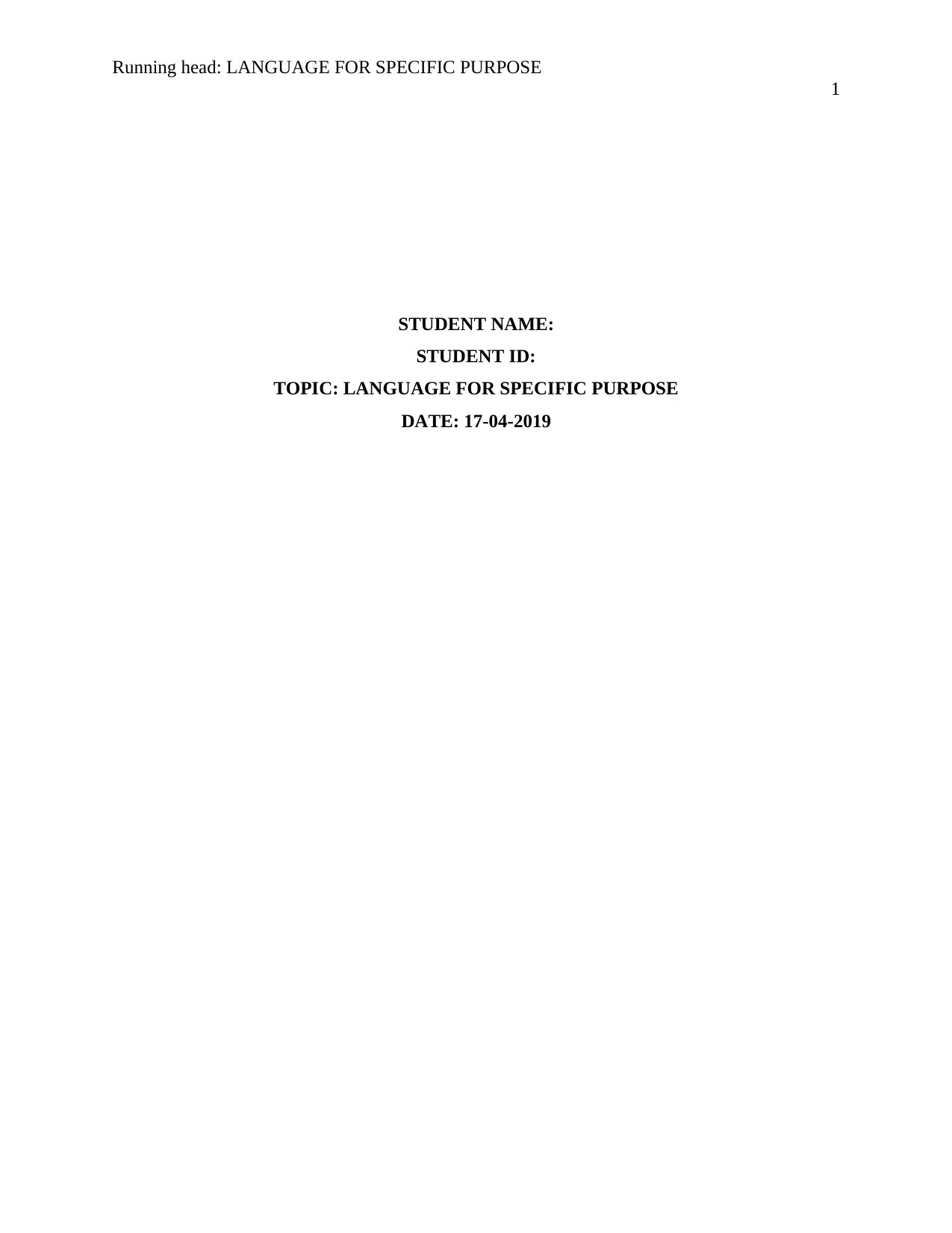
Running head: LANGUAGE FOR SPECIFIC PURPOSE
1
STUDENT NAME:
STUDENT ID:
TOPIC: LANGUAGE FOR SPECIFIC PURPOSE
DATE: 17-04-2019
1
STUDENT NAME:
STUDENT ID:
TOPIC: LANGUAGE FOR SPECIFIC PURPOSE
DATE: 17-04-2019
Paraphrase This Document
Need a fresh take? Get an instant paraphrase of this document with our AI Paraphraser
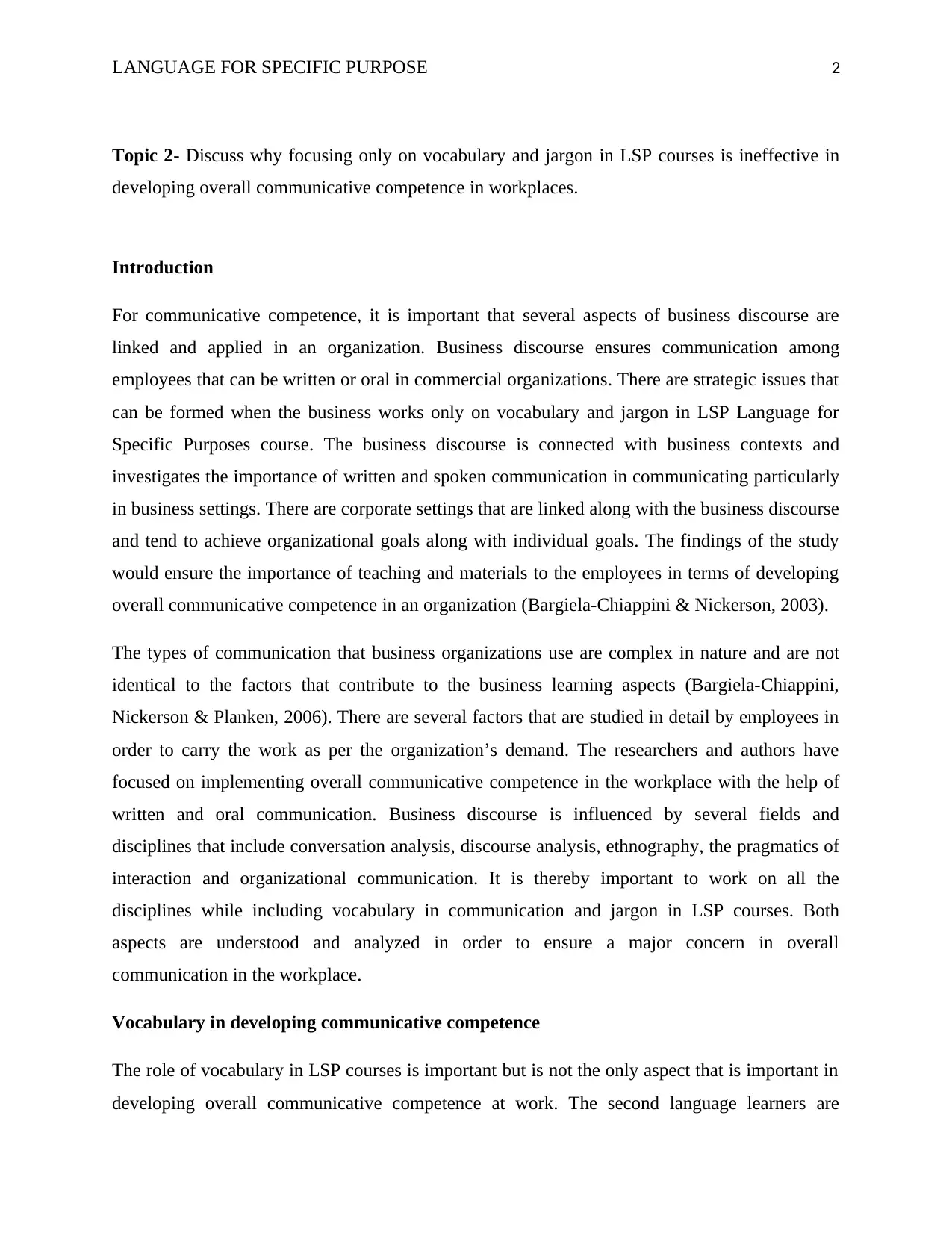
LANGUAGE FOR SPECIFIC PURPOSE 2
Topic 2- Discuss why focusing only on vocabulary and jargon in LSP courses is ineffective in
developing overall communicative competence in workplaces.
Introduction
For communicative competence, it is important that several aspects of business discourse are
linked and applied in an organization. Business discourse ensures communication among
employees that can be written or oral in commercial organizations. There are strategic issues that
can be formed when the business works only on vocabulary and jargon in LSP Language for
Specific Purposes course. The business discourse is connected with business contexts and
investigates the importance of written and spoken communication in communicating particularly
in business settings. There are corporate settings that are linked along with the business discourse
and tend to achieve organizational goals along with individual goals. The findings of the study
would ensure the importance of teaching and materials to the employees in terms of developing
overall communicative competence in an organization (Bargiela-Chiappini & Nickerson, 2003).
The types of communication that business organizations use are complex in nature and are not
identical to the factors that contribute to the business learning aspects (Bargiela-Chiappini,
Nickerson & Planken, 2006). There are several factors that are studied in detail by employees in
order to carry the work as per the organization’s demand. The researchers and authors have
focused on implementing overall communicative competence in the workplace with the help of
written and oral communication. Business discourse is influenced by several fields and
disciplines that include conversation analysis, discourse analysis, ethnography, the pragmatics of
interaction and organizational communication. It is thereby important to work on all the
disciplines while including vocabulary in communication and jargon in LSP courses. Both
aspects are understood and analyzed in order to ensure a major concern in overall
communication in the workplace.
Vocabulary in developing communicative competence
The role of vocabulary in LSP courses is important but is not the only aspect that is important in
developing overall communicative competence at work. The second language learners are
Topic 2- Discuss why focusing only on vocabulary and jargon in LSP courses is ineffective in
developing overall communicative competence in workplaces.
Introduction
For communicative competence, it is important that several aspects of business discourse are
linked and applied in an organization. Business discourse ensures communication among
employees that can be written or oral in commercial organizations. There are strategic issues that
can be formed when the business works only on vocabulary and jargon in LSP Language for
Specific Purposes course. The business discourse is connected with business contexts and
investigates the importance of written and spoken communication in communicating particularly
in business settings. There are corporate settings that are linked along with the business discourse
and tend to achieve organizational goals along with individual goals. The findings of the study
would ensure the importance of teaching and materials to the employees in terms of developing
overall communicative competence in an organization (Bargiela-Chiappini & Nickerson, 2003).
The types of communication that business organizations use are complex in nature and are not
identical to the factors that contribute to the business learning aspects (Bargiela-Chiappini,
Nickerson & Planken, 2006). There are several factors that are studied in detail by employees in
order to carry the work as per the organization’s demand. The researchers and authors have
focused on implementing overall communicative competence in the workplace with the help of
written and oral communication. Business discourse is influenced by several fields and
disciplines that include conversation analysis, discourse analysis, ethnography, the pragmatics of
interaction and organizational communication. It is thereby important to work on all the
disciplines while including vocabulary in communication and jargon in LSP courses. Both
aspects are understood and analyzed in order to ensure a major concern in overall
communication in the workplace.
Vocabulary in developing communicative competence
The role of vocabulary in LSP courses is important but is not the only aspect that is important in
developing overall communicative competence at work. The second language learners are
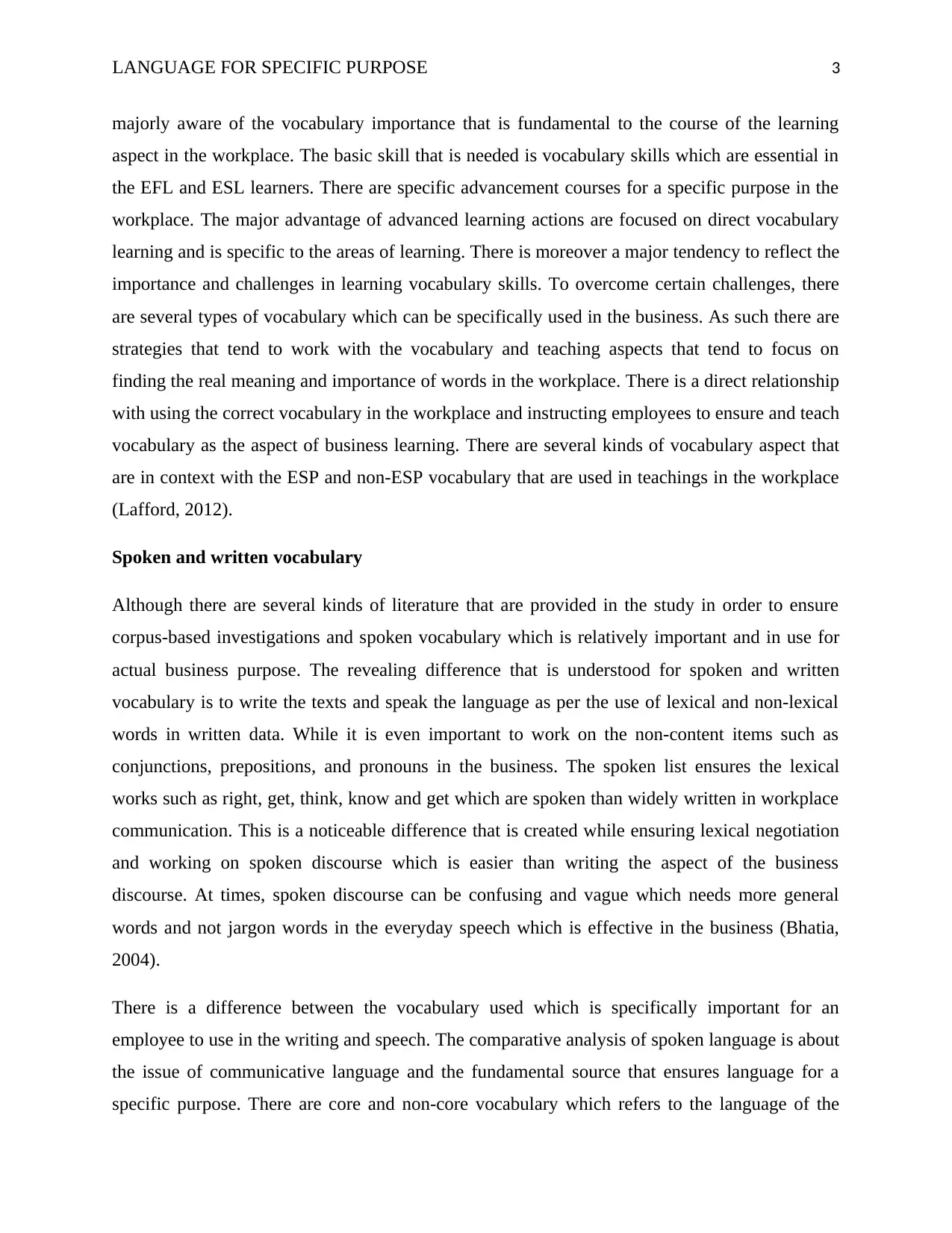
LANGUAGE FOR SPECIFIC PURPOSE 3
majorly aware of the vocabulary importance that is fundamental to the course of the learning
aspect in the workplace. The basic skill that is needed is vocabulary skills which are essential in
the EFL and ESL learners. There are specific advancement courses for a specific purpose in the
workplace. The major advantage of advanced learning actions are focused on direct vocabulary
learning and is specific to the areas of learning. There is moreover a major tendency to reflect the
importance and challenges in learning vocabulary skills. To overcome certain challenges, there
are several types of vocabulary which can be specifically used in the business. As such there are
strategies that tend to work with the vocabulary and teaching aspects that tend to focus on
finding the real meaning and importance of words in the workplace. There is a direct relationship
with using the correct vocabulary in the workplace and instructing employees to ensure and teach
vocabulary as the aspect of business learning. There are several kinds of vocabulary aspect that
are in context with the ESP and non-ESP vocabulary that are used in teachings in the workplace
(Lafford, 2012).
Spoken and written vocabulary
Although there are several kinds of literature that are provided in the study in order to ensure
corpus-based investigations and spoken vocabulary which is relatively important and in use for
actual business purpose. The revealing difference that is understood for spoken and written
vocabulary is to write the texts and speak the language as per the use of lexical and non-lexical
words in written data. While it is even important to work on the non-content items such as
conjunctions, prepositions, and pronouns in the business. The spoken list ensures the lexical
works such as right, get, think, know and get which are spoken than widely written in workplace
communication. This is a noticeable difference that is created while ensuring lexical negotiation
and working on spoken discourse which is easier than writing the aspect of the business
discourse. At times, spoken discourse can be confusing and vague which needs more general
words and not jargon words in the everyday speech which is effective in the business (Bhatia,
2004).
There is a difference between the vocabulary used which is specifically important for an
employee to use in the writing and speech. The comparative analysis of spoken language is about
the issue of communicative language and the fundamental source that ensures language for a
specific purpose. There are core and non-core vocabulary which refers to the language of the
majorly aware of the vocabulary importance that is fundamental to the course of the learning
aspect in the workplace. The basic skill that is needed is vocabulary skills which are essential in
the EFL and ESL learners. There are specific advancement courses for a specific purpose in the
workplace. The major advantage of advanced learning actions are focused on direct vocabulary
learning and is specific to the areas of learning. There is moreover a major tendency to reflect the
importance and challenges in learning vocabulary skills. To overcome certain challenges, there
are several types of vocabulary which can be specifically used in the business. As such there are
strategies that tend to work with the vocabulary and teaching aspects that tend to focus on
finding the real meaning and importance of words in the workplace. There is a direct relationship
with using the correct vocabulary in the workplace and instructing employees to ensure and teach
vocabulary as the aspect of business learning. There are several kinds of vocabulary aspect that
are in context with the ESP and non-ESP vocabulary that are used in teachings in the workplace
(Lafford, 2012).
Spoken and written vocabulary
Although there are several kinds of literature that are provided in the study in order to ensure
corpus-based investigations and spoken vocabulary which is relatively important and in use for
actual business purpose. The revealing difference that is understood for spoken and written
vocabulary is to write the texts and speak the language as per the use of lexical and non-lexical
words in written data. While it is even important to work on the non-content items such as
conjunctions, prepositions, and pronouns in the business. The spoken list ensures the lexical
works such as right, get, think, know and get which are spoken than widely written in workplace
communication. This is a noticeable difference that is created while ensuring lexical negotiation
and working on spoken discourse which is easier than writing the aspect of the business
discourse. At times, spoken discourse can be confusing and vague which needs more general
words and not jargon words in the everyday speech which is effective in the business (Bhatia,
2004).
There is a difference between the vocabulary used which is specifically important for an
employee to use in the writing and speech. The comparative analysis of spoken language is about
the issue of communicative language and the fundamental source that ensures language for a
specific purpose. There are core and non-core vocabulary which refers to the language of the
⊘ This is a preview!⊘
Do you want full access?
Subscribe today to unlock all pages.

Trusted by 1+ million students worldwide
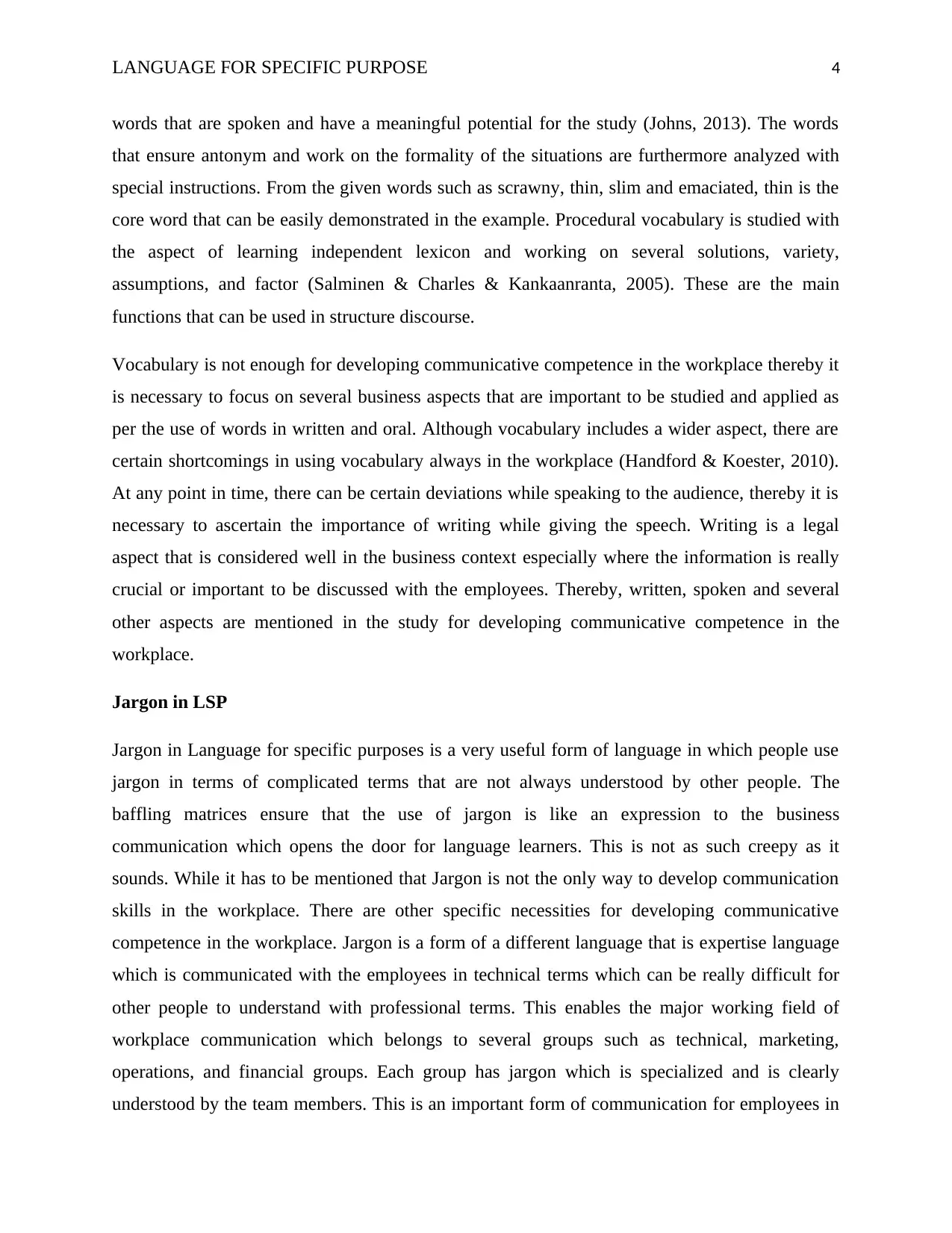
LANGUAGE FOR SPECIFIC PURPOSE 4
words that are spoken and have a meaningful potential for the study (Johns, 2013). The words
that ensure antonym and work on the formality of the situations are furthermore analyzed with
special instructions. From the given words such as scrawny, thin, slim and emaciated, thin is the
core word that can be easily demonstrated in the example. Procedural vocabulary is studied with
the aspect of learning independent lexicon and working on several solutions, variety,
assumptions, and factor (Salminen & Charles & Kankaanranta, 2005). These are the main
functions that can be used in structure discourse.
Vocabulary is not enough for developing communicative competence in the workplace thereby it
is necessary to focus on several business aspects that are important to be studied and applied as
per the use of words in written and oral. Although vocabulary includes a wider aspect, there are
certain shortcomings in using vocabulary always in the workplace (Handford & Koester, 2010).
At any point in time, there can be certain deviations while speaking to the audience, thereby it is
necessary to ascertain the importance of writing while giving the speech. Writing is a legal
aspect that is considered well in the business context especially where the information is really
crucial or important to be discussed with the employees. Thereby, written, spoken and several
other aspects are mentioned in the study for developing communicative competence in the
workplace.
Jargon in LSP
Jargon in Language for specific purposes is a very useful form of language in which people use
jargon in terms of complicated terms that are not always understood by other people. The
baffling matrices ensure that the use of jargon is like an expression to the business
communication which opens the door for language learners. This is not as such creepy as it
sounds. While it has to be mentioned that Jargon is not the only way to develop communication
skills in the workplace. There are other specific necessities for developing communicative
competence in the workplace. Jargon is a form of a different language that is expertise language
which is communicated with the employees in technical terms which can be really difficult for
other people to understand with professional terms. This enables the major working field of
workplace communication which belongs to several groups such as technical, marketing,
operations, and financial groups. Each group has jargon which is specialized and is clearly
understood by the team members. This is an important form of communication for employees in
words that are spoken and have a meaningful potential for the study (Johns, 2013). The words
that ensure antonym and work on the formality of the situations are furthermore analyzed with
special instructions. From the given words such as scrawny, thin, slim and emaciated, thin is the
core word that can be easily demonstrated in the example. Procedural vocabulary is studied with
the aspect of learning independent lexicon and working on several solutions, variety,
assumptions, and factor (Salminen & Charles & Kankaanranta, 2005). These are the main
functions that can be used in structure discourse.
Vocabulary is not enough for developing communicative competence in the workplace thereby it
is necessary to focus on several business aspects that are important to be studied and applied as
per the use of words in written and oral. Although vocabulary includes a wider aspect, there are
certain shortcomings in using vocabulary always in the workplace (Handford & Koester, 2010).
At any point in time, there can be certain deviations while speaking to the audience, thereby it is
necessary to ascertain the importance of writing while giving the speech. Writing is a legal
aspect that is considered well in the business context especially where the information is really
crucial or important to be discussed with the employees. Thereby, written, spoken and several
other aspects are mentioned in the study for developing communicative competence in the
workplace.
Jargon in LSP
Jargon in Language for specific purposes is a very useful form of language in which people use
jargon in terms of complicated terms that are not always understood by other people. The
baffling matrices ensure that the use of jargon is like an expression to the business
communication which opens the door for language learners. This is not as such creepy as it
sounds. While it has to be mentioned that Jargon is not the only way to develop communication
skills in the workplace. There are other specific necessities for developing communicative
competence in the workplace. Jargon is a form of a different language that is expertise language
which is communicated with the employees in technical terms which can be really difficult for
other people to understand with professional terms. This enables the major working field of
workplace communication which belongs to several groups such as technical, marketing,
operations, and financial groups. Each group has jargon which is specialized and is clearly
understood by the team members. This is an important form of communication for employees in
Paraphrase This Document
Need a fresh take? Get an instant paraphrase of this document with our AI Paraphraser
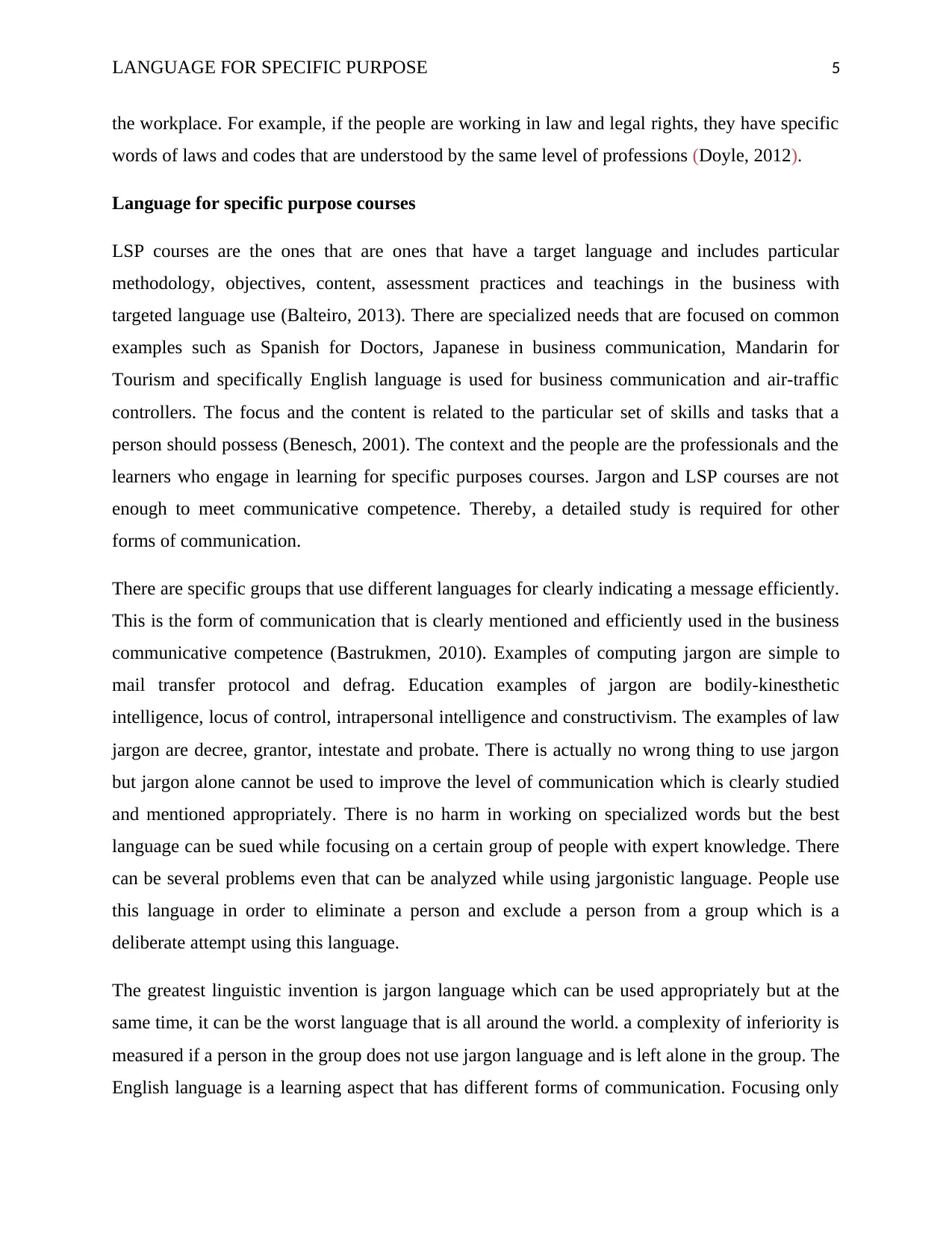
LANGUAGE FOR SPECIFIC PURPOSE 5
the workplace. For example, if the people are working in law and legal rights, they have specific
words of laws and codes that are understood by the same level of professions (Doyle, 2012).
Language for specific purpose courses
LSP courses are the ones that are ones that have a target language and includes particular
methodology, objectives, content, assessment practices and teachings in the business with
targeted language use (Balteiro, 2013). There are specialized needs that are focused on common
examples such as Spanish for Doctors, Japanese in business communication, Mandarin for
Tourism and specifically English language is used for business communication and air-traffic
controllers. The focus and the content is related to the particular set of skills and tasks that a
person should possess (Benesch, 2001). The context and the people are the professionals and the
learners who engage in learning for specific purposes courses. Jargon and LSP courses are not
enough to meet communicative competence. Thereby, a detailed study is required for other
forms of communication.
There are specific groups that use different languages for clearly indicating a message efficiently.
This is the form of communication that is clearly mentioned and efficiently used in the business
communicative competence (Bastrukmen, 2010). Examples of computing jargon are simple to
mail transfer protocol and defrag. Education examples of jargon are bodily-kinesthetic
intelligence, locus of control, intrapersonal intelligence and constructivism. The examples of law
jargon are decree, grantor, intestate and probate. There is actually no wrong thing to use jargon
but jargon alone cannot be used to improve the level of communication which is clearly studied
and mentioned appropriately. There is no harm in working on specialized words but the best
language can be sued while focusing on a certain group of people with expert knowledge. There
can be several problems even that can be analyzed while using jargonistic language. People use
this language in order to eliminate a person and exclude a person from a group which is a
deliberate attempt using this language.
The greatest linguistic invention is jargon language which can be used appropriately but at the
same time, it can be the worst language that is all around the world. a complexity of inferiority is
measured if a person in the group does not use jargon language and is left alone in the group. The
English language is a learning aspect that has different forms of communication. Focusing only
the workplace. For example, if the people are working in law and legal rights, they have specific
words of laws and codes that are understood by the same level of professions (Doyle, 2012).
Language for specific purpose courses
LSP courses are the ones that are ones that have a target language and includes particular
methodology, objectives, content, assessment practices and teachings in the business with
targeted language use (Balteiro, 2013). There are specialized needs that are focused on common
examples such as Spanish for Doctors, Japanese in business communication, Mandarin for
Tourism and specifically English language is used for business communication and air-traffic
controllers. The focus and the content is related to the particular set of skills and tasks that a
person should possess (Benesch, 2001). The context and the people are the professionals and the
learners who engage in learning for specific purposes courses. Jargon and LSP courses are not
enough to meet communicative competence. Thereby, a detailed study is required for other
forms of communication.
There are specific groups that use different languages for clearly indicating a message efficiently.
This is the form of communication that is clearly mentioned and efficiently used in the business
communicative competence (Bastrukmen, 2010). Examples of computing jargon are simple to
mail transfer protocol and defrag. Education examples of jargon are bodily-kinesthetic
intelligence, locus of control, intrapersonal intelligence and constructivism. The examples of law
jargon are decree, grantor, intestate and probate. There is actually no wrong thing to use jargon
but jargon alone cannot be used to improve the level of communication which is clearly studied
and mentioned appropriately. There is no harm in working on specialized words but the best
language can be sued while focusing on a certain group of people with expert knowledge. There
can be several problems even that can be analyzed while using jargonistic language. People use
this language in order to eliminate a person and exclude a person from a group which is a
deliberate attempt using this language.
The greatest linguistic invention is jargon language which can be used appropriately but at the
same time, it can be the worst language that is all around the world. a complexity of inferiority is
measured if a person in the group does not use jargon language and is left alone in the group. The
English language is a learning aspect that has different forms of communication. Focusing only
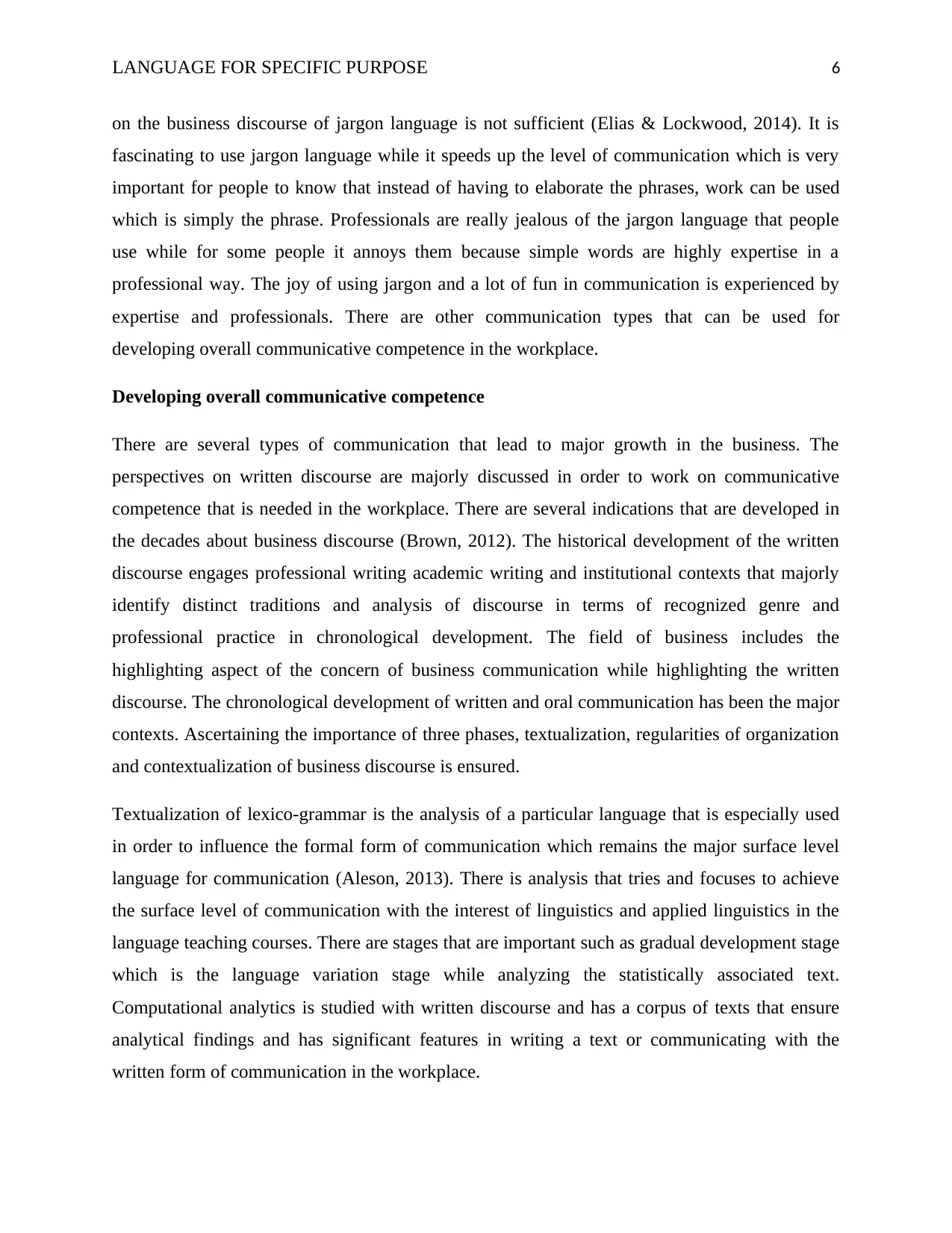
LANGUAGE FOR SPECIFIC PURPOSE 6
on the business discourse of jargon language is not sufficient (Elias & Lockwood, 2014). It is
fascinating to use jargon language while it speeds up the level of communication which is very
important for people to know that instead of having to elaborate the phrases, work can be used
which is simply the phrase. Professionals are really jealous of the jargon language that people
use while for some people it annoys them because simple words are highly expertise in a
professional way. The joy of using jargon and a lot of fun in communication is experienced by
expertise and professionals. There are other communication types that can be used for
developing overall communicative competence in the workplace.
Developing overall communicative competence
There are several types of communication that lead to major growth in the business. The
perspectives on written discourse are majorly discussed in order to work on communicative
competence that is needed in the workplace. There are several indications that are developed in
the decades about business discourse (Brown, 2012). The historical development of the written
discourse engages professional writing academic writing and institutional contexts that majorly
identify distinct traditions and analysis of discourse in terms of recognized genre and
professional practice in chronological development. The field of business includes the
highlighting aspect of the concern of business communication while highlighting the written
discourse. The chronological development of written and oral communication has been the major
contexts. Ascertaining the importance of three phases, textualization, regularities of organization
and contextualization of business discourse is ensured.
Textualization of lexico-grammar is the analysis of a particular language that is especially used
in order to influence the formal form of communication which remains the major surface level
language for communication (Aleson, 2013). There is analysis that tries and focuses to achieve
the surface level of communication with the interest of linguistics and applied linguistics in the
language teaching courses. There are stages that are important such as gradual development stage
which is the language variation stage while analyzing the statistically associated text.
Computational analytics is studied with written discourse and has a corpus of texts that ensure
analytical findings and has significant features in writing a text or communicating with the
written form of communication in the workplace.
on the business discourse of jargon language is not sufficient (Elias & Lockwood, 2014). It is
fascinating to use jargon language while it speeds up the level of communication which is very
important for people to know that instead of having to elaborate the phrases, work can be used
which is simply the phrase. Professionals are really jealous of the jargon language that people
use while for some people it annoys them because simple words are highly expertise in a
professional way. The joy of using jargon and a lot of fun in communication is experienced by
expertise and professionals. There are other communication types that can be used for
developing overall communicative competence in the workplace.
Developing overall communicative competence
There are several types of communication that lead to major growth in the business. The
perspectives on written discourse are majorly discussed in order to work on communicative
competence that is needed in the workplace. There are several indications that are developed in
the decades about business discourse (Brown, 2012). The historical development of the written
discourse engages professional writing academic writing and institutional contexts that majorly
identify distinct traditions and analysis of discourse in terms of recognized genre and
professional practice in chronological development. The field of business includes the
highlighting aspect of the concern of business communication while highlighting the written
discourse. The chronological development of written and oral communication has been the major
contexts. Ascertaining the importance of three phases, textualization, regularities of organization
and contextualization of business discourse is ensured.
Textualization of lexico-grammar is the analysis of a particular language that is especially used
in order to influence the formal form of communication which remains the major surface level
language for communication (Aleson, 2013). There is analysis that tries and focuses to achieve
the surface level of communication with the interest of linguistics and applied linguistics in the
language teaching courses. There are stages that are important such as gradual development stage
which is the language variation stage while analyzing the statistically associated text.
Computational analytics is studied with written discourse and has a corpus of texts that ensure
analytical findings and has significant features in writing a text or communicating with the
written form of communication in the workplace.
⊘ This is a preview!⊘
Do you want full access?
Subscribe today to unlock all pages.

Trusted by 1+ million students worldwide
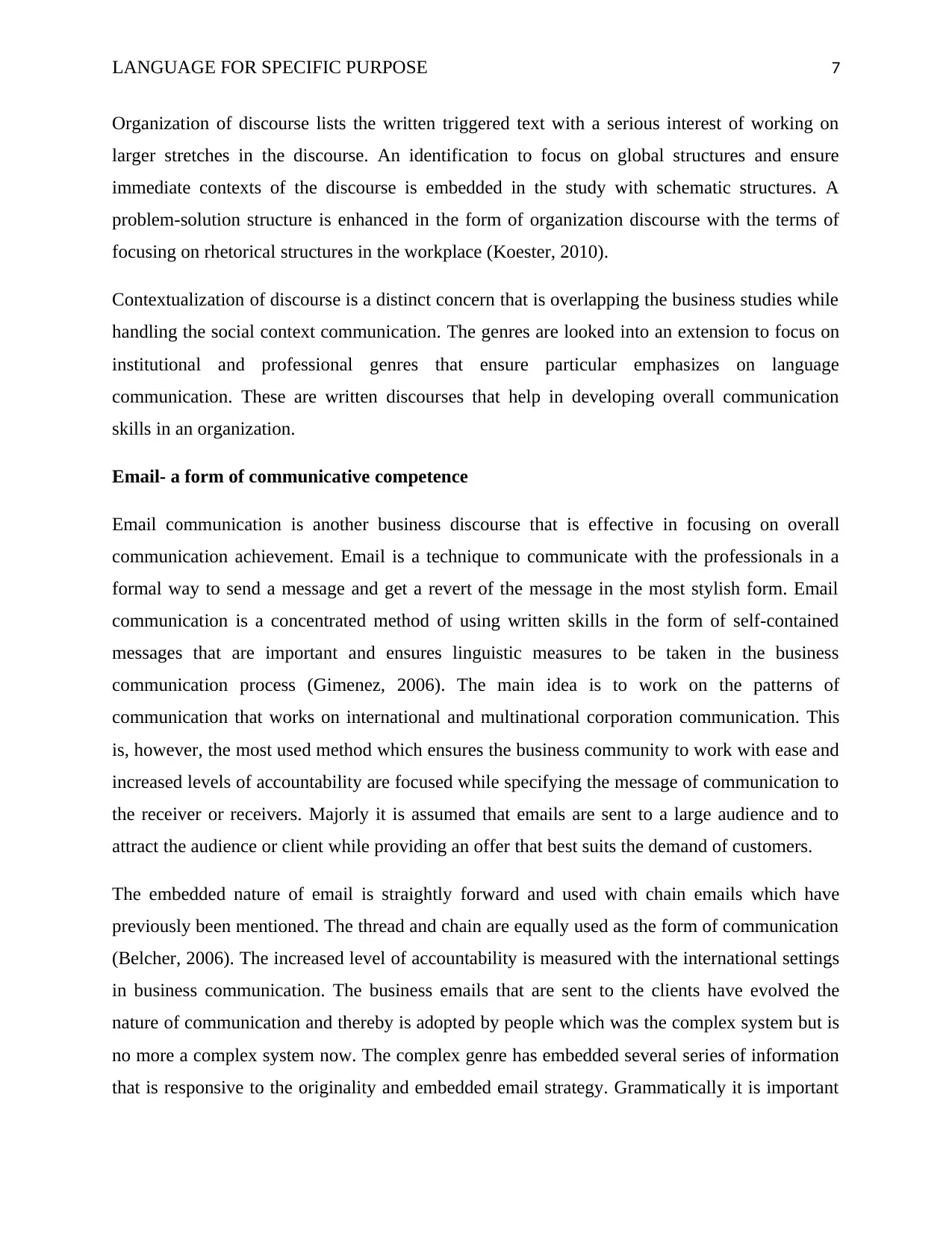
LANGUAGE FOR SPECIFIC PURPOSE 7
Organization of discourse lists the written triggered text with a serious interest of working on
larger stretches in the discourse. An identification to focus on global structures and ensure
immediate contexts of the discourse is embedded in the study with schematic structures. A
problem-solution structure is enhanced in the form of organization discourse with the terms of
focusing on rhetorical structures in the workplace (Koester, 2010).
Contextualization of discourse is a distinct concern that is overlapping the business studies while
handling the social context communication. The genres are looked into an extension to focus on
institutional and professional genres that ensure particular emphasizes on language
communication. These are written discourses that help in developing overall communication
skills in an organization.
Email- a form of communicative competence
Email communication is another business discourse that is effective in focusing on overall
communication achievement. Email is a technique to communicate with the professionals in a
formal way to send a message and get a revert of the message in the most stylish form. Email
communication is a concentrated method of using written skills in the form of self-contained
messages that are important and ensures linguistic measures to be taken in the business
communication process (Gimenez, 2006). The main idea is to work on the patterns of
communication that works on international and multinational corporation communication. This
is, however, the most used method which ensures the business community to work with ease and
increased levels of accountability are focused while specifying the message of communication to
the receiver or receivers. Majorly it is assumed that emails are sent to a large audience and to
attract the audience or client while providing an offer that best suits the demand of customers.
The embedded nature of email is straightly forward and used with chain emails which have
previously been mentioned. The thread and chain are equally used as the form of communication
(Belcher, 2006). The increased level of accountability is measured with the international settings
in business communication. The business emails that are sent to the clients have evolved the
nature of communication and thereby is adopted by people which was the complex system but is
no more a complex system now. The complex genre has embedded several series of information
that is responsive to the originality and embedded email strategy. Grammatically it is important
Organization of discourse lists the written triggered text with a serious interest of working on
larger stretches in the discourse. An identification to focus on global structures and ensure
immediate contexts of the discourse is embedded in the study with schematic structures. A
problem-solution structure is enhanced in the form of organization discourse with the terms of
focusing on rhetorical structures in the workplace (Koester, 2010).
Contextualization of discourse is a distinct concern that is overlapping the business studies while
handling the social context communication. The genres are looked into an extension to focus on
institutional and professional genres that ensure particular emphasizes on language
communication. These are written discourses that help in developing overall communication
skills in an organization.
Email- a form of communicative competence
Email communication is another business discourse that is effective in focusing on overall
communication achievement. Email is a technique to communicate with the professionals in a
formal way to send a message and get a revert of the message in the most stylish form. Email
communication is a concentrated method of using written skills in the form of self-contained
messages that are important and ensures linguistic measures to be taken in the business
communication process (Gimenez, 2006). The main idea is to work on the patterns of
communication that works on international and multinational corporation communication. This
is, however, the most used method which ensures the business community to work with ease and
increased levels of accountability are focused while specifying the message of communication to
the receiver or receivers. Majorly it is assumed that emails are sent to a large audience and to
attract the audience or client while providing an offer that best suits the demand of customers.
The embedded nature of email is straightly forward and used with chain emails which have
previously been mentioned. The thread and chain are equally used as the form of communication
(Belcher, 2006). The increased level of accountability is measured with the international settings
in business communication. The business emails that are sent to the clients have evolved the
nature of communication and thereby is adopted by people which was the complex system but is
no more a complex system now. The complex genre has embedded several series of information
that is responsive to the originality and embedded email strategy. Grammatically it is important
Paraphrase This Document
Need a fresh take? Get an instant paraphrase of this document with our AI Paraphraser
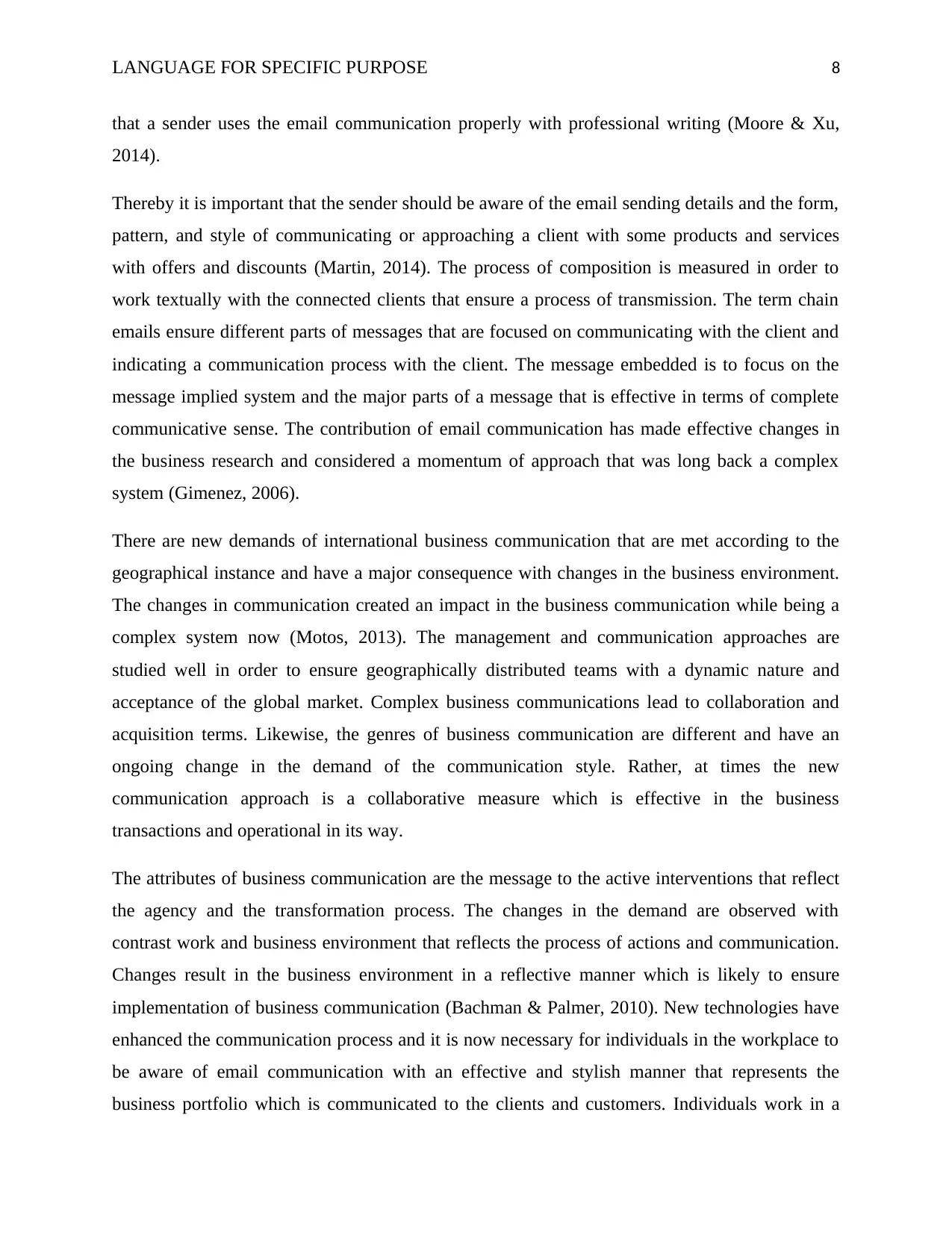
LANGUAGE FOR SPECIFIC PURPOSE 8
that a sender uses the email communication properly with professional writing (Moore & Xu,
2014).
Thereby it is important that the sender should be aware of the email sending details and the form,
pattern, and style of communicating or approaching a client with some products and services
with offers and discounts (Martin, 2014). The process of composition is measured in order to
work textually with the connected clients that ensure a process of transmission. The term chain
emails ensure different parts of messages that are focused on communicating with the client and
indicating a communication process with the client. The message embedded is to focus on the
message implied system and the major parts of a message that is effective in terms of complete
communicative sense. The contribution of email communication has made effective changes in
the business research and considered a momentum of approach that was long back a complex
system (Gimenez, 2006).
There are new demands of international business communication that are met according to the
geographical instance and have a major consequence with changes in the business environment.
The changes in communication created an impact in the business communication while being a
complex system now (Motos, 2013). The management and communication approaches are
studied well in order to ensure geographically distributed teams with a dynamic nature and
acceptance of the global market. Complex business communications lead to collaboration and
acquisition terms. Likewise, the genres of business communication are different and have an
ongoing change in the demand of the communication style. Rather, at times the new
communication approach is a collaborative measure which is effective in the business
transactions and operational in its way.
The attributes of business communication are the message to the active interventions that reflect
the agency and the transformation process. The changes in the demand are observed with
contrast work and business environment that reflects the process of actions and communication.
Changes result in the business environment in a reflective manner which is likely to ensure
implementation of business communication (Bachman & Palmer, 2010). New technologies have
enhanced the communication process and it is now necessary for individuals in the workplace to
be aware of email communication with an effective and stylish manner that represents the
business portfolio which is communicated to the clients and customers. Individuals work in a
that a sender uses the email communication properly with professional writing (Moore & Xu,
2014).
Thereby it is important that the sender should be aware of the email sending details and the form,
pattern, and style of communicating or approaching a client with some products and services
with offers and discounts (Martin, 2014). The process of composition is measured in order to
work textually with the connected clients that ensure a process of transmission. The term chain
emails ensure different parts of messages that are focused on communicating with the client and
indicating a communication process with the client. The message embedded is to focus on the
message implied system and the major parts of a message that is effective in terms of complete
communicative sense. The contribution of email communication has made effective changes in
the business research and considered a momentum of approach that was long back a complex
system (Gimenez, 2006).
There are new demands of international business communication that are met according to the
geographical instance and have a major consequence with changes in the business environment.
The changes in communication created an impact in the business communication while being a
complex system now (Motos, 2013). The management and communication approaches are
studied well in order to ensure geographically distributed teams with a dynamic nature and
acceptance of the global market. Complex business communications lead to collaboration and
acquisition terms. Likewise, the genres of business communication are different and have an
ongoing change in the demand of the communication style. Rather, at times the new
communication approach is a collaborative measure which is effective in the business
transactions and operational in its way.
The attributes of business communication are the message to the active interventions that reflect
the agency and the transformation process. The changes in the demand are observed with
contrast work and business environment that reflects the process of actions and communication.
Changes result in the business environment in a reflective manner which is likely to ensure
implementation of business communication (Bachman & Palmer, 2010). New technologies have
enhanced the communication process and it is now necessary for individuals in the workplace to
be aware of email communication with an effective and stylish manner that represents the
business portfolio which is communicated to the clients and customers. Individuals work in a
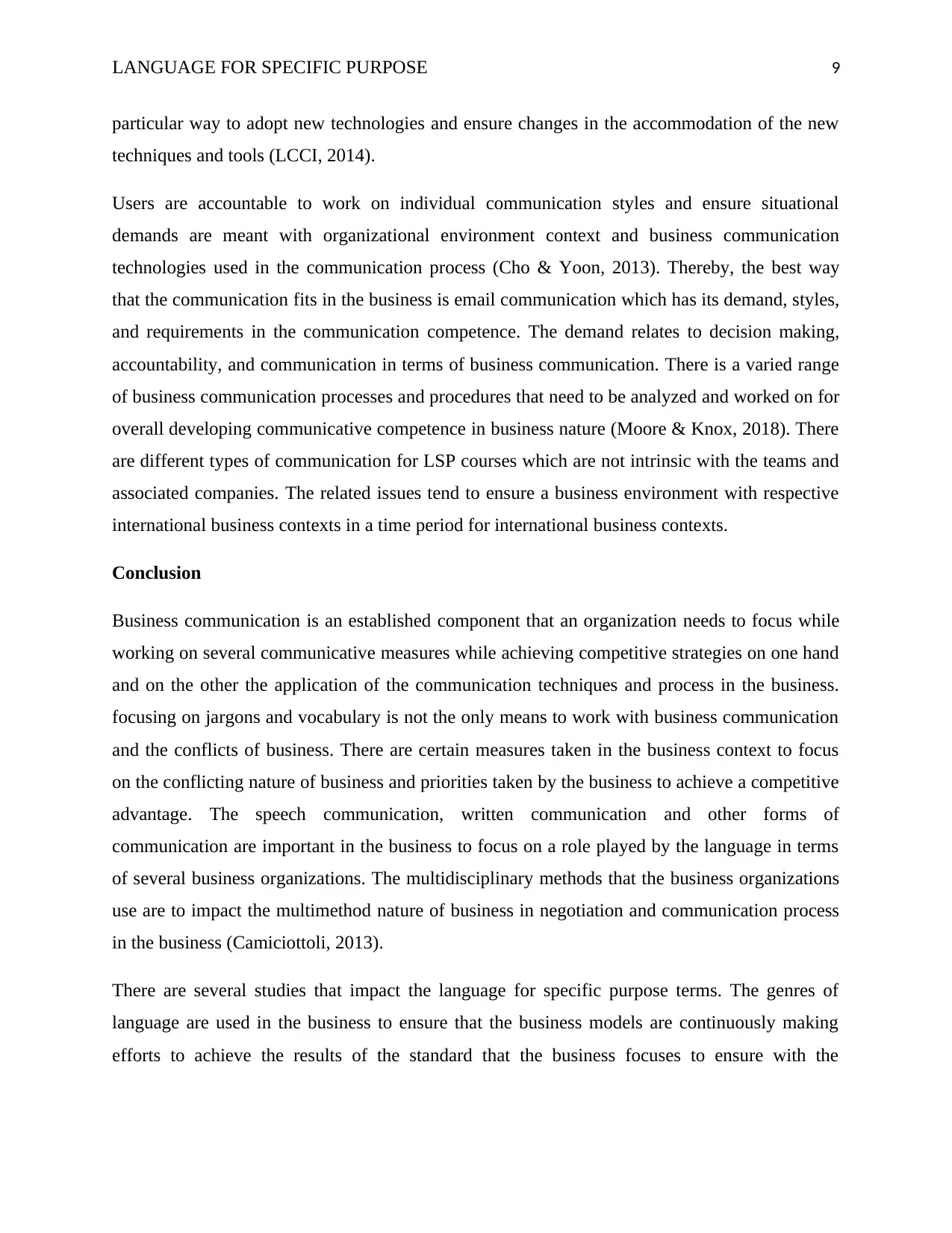
LANGUAGE FOR SPECIFIC PURPOSE 9
particular way to adopt new technologies and ensure changes in the accommodation of the new
techniques and tools (LCCI, 2014).
Users are accountable to work on individual communication styles and ensure situational
demands are meant with organizational environment context and business communication
technologies used in the communication process (Cho & Yoon, 2013). Thereby, the best way
that the communication fits in the business is email communication which has its demand, styles,
and requirements in the communication competence. The demand relates to decision making,
accountability, and communication in terms of business communication. There is a varied range
of business communication processes and procedures that need to be analyzed and worked on for
overall developing communicative competence in business nature (Moore & Knox, 2018). There
are different types of communication for LSP courses which are not intrinsic with the teams and
associated companies. The related issues tend to ensure a business environment with respective
international business contexts in a time period for international business contexts.
Conclusion
Business communication is an established component that an organization needs to focus while
working on several communicative measures while achieving competitive strategies on one hand
and on the other the application of the communication techniques and process in the business.
focusing on jargons and vocabulary is not the only means to work with business communication
and the conflicts of business. There are certain measures taken in the business context to focus
on the conflicting nature of business and priorities taken by the business to achieve a competitive
advantage. The speech communication, written communication and other forms of
communication are important in the business to focus on a role played by the language in terms
of several business organizations. The multidisciplinary methods that the business organizations
use are to impact the multimethod nature of business in negotiation and communication process
in the business (Camiciottoli, 2013).
There are several studies that impact the language for specific purpose terms. The genres of
language are used in the business to ensure that the business models are continuously making
efforts to achieve the results of the standard that the business focuses to ensure with the
particular way to adopt new technologies and ensure changes in the accommodation of the new
techniques and tools (LCCI, 2014).
Users are accountable to work on individual communication styles and ensure situational
demands are meant with organizational environment context and business communication
technologies used in the communication process (Cho & Yoon, 2013). Thereby, the best way
that the communication fits in the business is email communication which has its demand, styles,
and requirements in the communication competence. The demand relates to decision making,
accountability, and communication in terms of business communication. There is a varied range
of business communication processes and procedures that need to be analyzed and worked on for
overall developing communicative competence in business nature (Moore & Knox, 2018). There
are different types of communication for LSP courses which are not intrinsic with the teams and
associated companies. The related issues tend to ensure a business environment with respective
international business contexts in a time period for international business contexts.
Conclusion
Business communication is an established component that an organization needs to focus while
working on several communicative measures while achieving competitive strategies on one hand
and on the other the application of the communication techniques and process in the business.
focusing on jargons and vocabulary is not the only means to work with business communication
and the conflicts of business. There are certain measures taken in the business context to focus
on the conflicting nature of business and priorities taken by the business to achieve a competitive
advantage. The speech communication, written communication and other forms of
communication are important in the business to focus on a role played by the language in terms
of several business organizations. The multidisciplinary methods that the business organizations
use are to impact the multimethod nature of business in negotiation and communication process
in the business (Camiciottoli, 2013).
There are several studies that impact the language for specific purpose terms. The genres of
language are used in the business to ensure that the business models are continuously making
efforts to achieve the results of the standard that the business focuses to ensure with the
⊘ This is a preview!⊘
Do you want full access?
Subscribe today to unlock all pages.

Trusted by 1+ million students worldwide
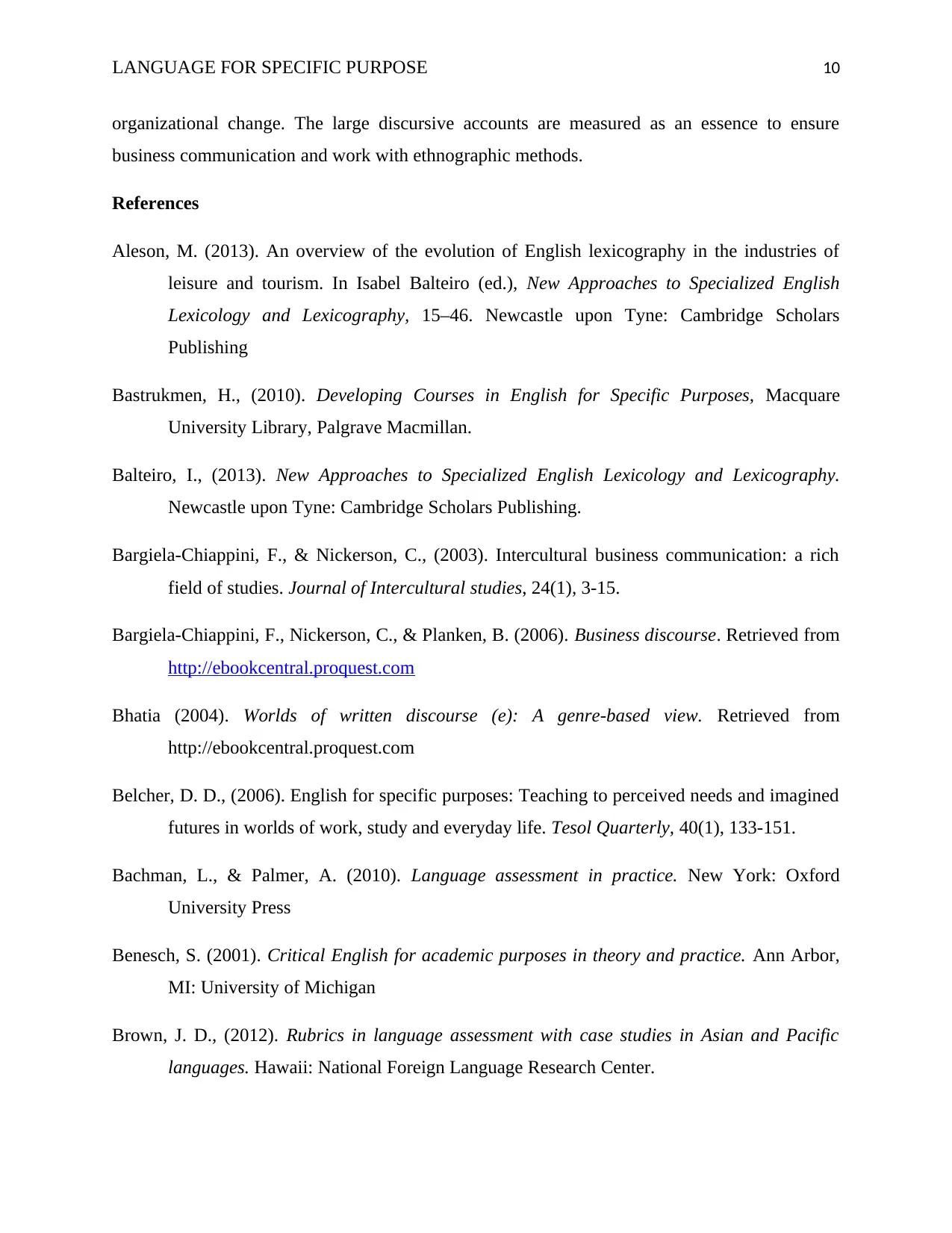
LANGUAGE FOR SPECIFIC PURPOSE 10
organizational change. The large discursive accounts are measured as an essence to ensure
business communication and work with ethnographic methods.
References
Aleson, M. (2013). An overview of the evolution of English lexicography in the industries of
leisure and tourism. In Isabel Balteiro (ed.), New Approaches to Specialized English
Lexicology and Lexicography, 15–46. Newcastle upon Tyne: Cambridge Scholars
Publishing
Bastrukmen, H., (2010). Developing Courses in English for Specific Purposes, Macquare
University Library, Palgrave Macmillan.
Balteiro, I., (2013). New Approaches to Specialized English Lexicology and Lexicography.
Newcastle upon Tyne: Cambridge Scholars Publishing.
Bargiela-Chiappini, F., & Nickerson, C., (2003). Intercultural business communication: a rich
field of studies. Journal of Intercultural studies, 24(1), 3-15.
Bargiela-Chiappini, F., Nickerson, C., & Planken, B. (2006). Business discourse. Retrieved from
http://ebookcentral.proquest.com
Bhatia (2004). Worlds of written discourse (e): A genre-based view. Retrieved from
http://ebookcentral.proquest.com
Belcher, D. D., (2006). English for specific purposes: Teaching to perceived needs and imagined
futures in worlds of work, study and everyday life. Tesol Quarterly, 40(1), 133-151.
Bachman, L., & Palmer, A. (2010). Language assessment in practice. New York: Oxford
University Press
Benesch, S. (2001). Critical English for academic purposes in theory and practice. Ann Arbor,
MI: University of Michigan
Brown, J. D., (2012). Rubrics in language assessment with case studies in Asian and Pacific
languages. Hawaii: National Foreign Language Research Center.
organizational change. The large discursive accounts are measured as an essence to ensure
business communication and work with ethnographic methods.
References
Aleson, M. (2013). An overview of the evolution of English lexicography in the industries of
leisure and tourism. In Isabel Balteiro (ed.), New Approaches to Specialized English
Lexicology and Lexicography, 15–46. Newcastle upon Tyne: Cambridge Scholars
Publishing
Bastrukmen, H., (2010). Developing Courses in English for Specific Purposes, Macquare
University Library, Palgrave Macmillan.
Balteiro, I., (2013). New Approaches to Specialized English Lexicology and Lexicography.
Newcastle upon Tyne: Cambridge Scholars Publishing.
Bargiela-Chiappini, F., & Nickerson, C., (2003). Intercultural business communication: a rich
field of studies. Journal of Intercultural studies, 24(1), 3-15.
Bargiela-Chiappini, F., Nickerson, C., & Planken, B. (2006). Business discourse. Retrieved from
http://ebookcentral.proquest.com
Bhatia (2004). Worlds of written discourse (e): A genre-based view. Retrieved from
http://ebookcentral.proquest.com
Belcher, D. D., (2006). English for specific purposes: Teaching to perceived needs and imagined
futures in worlds of work, study and everyday life. Tesol Quarterly, 40(1), 133-151.
Bachman, L., & Palmer, A. (2010). Language assessment in practice. New York: Oxford
University Press
Benesch, S. (2001). Critical English for academic purposes in theory and practice. Ann Arbor,
MI: University of Michigan
Brown, J. D., (2012). Rubrics in language assessment with case studies in Asian and Pacific
languages. Hawaii: National Foreign Language Research Center.
Paraphrase This Document
Need a fresh take? Get an instant paraphrase of this document with our AI Paraphraser
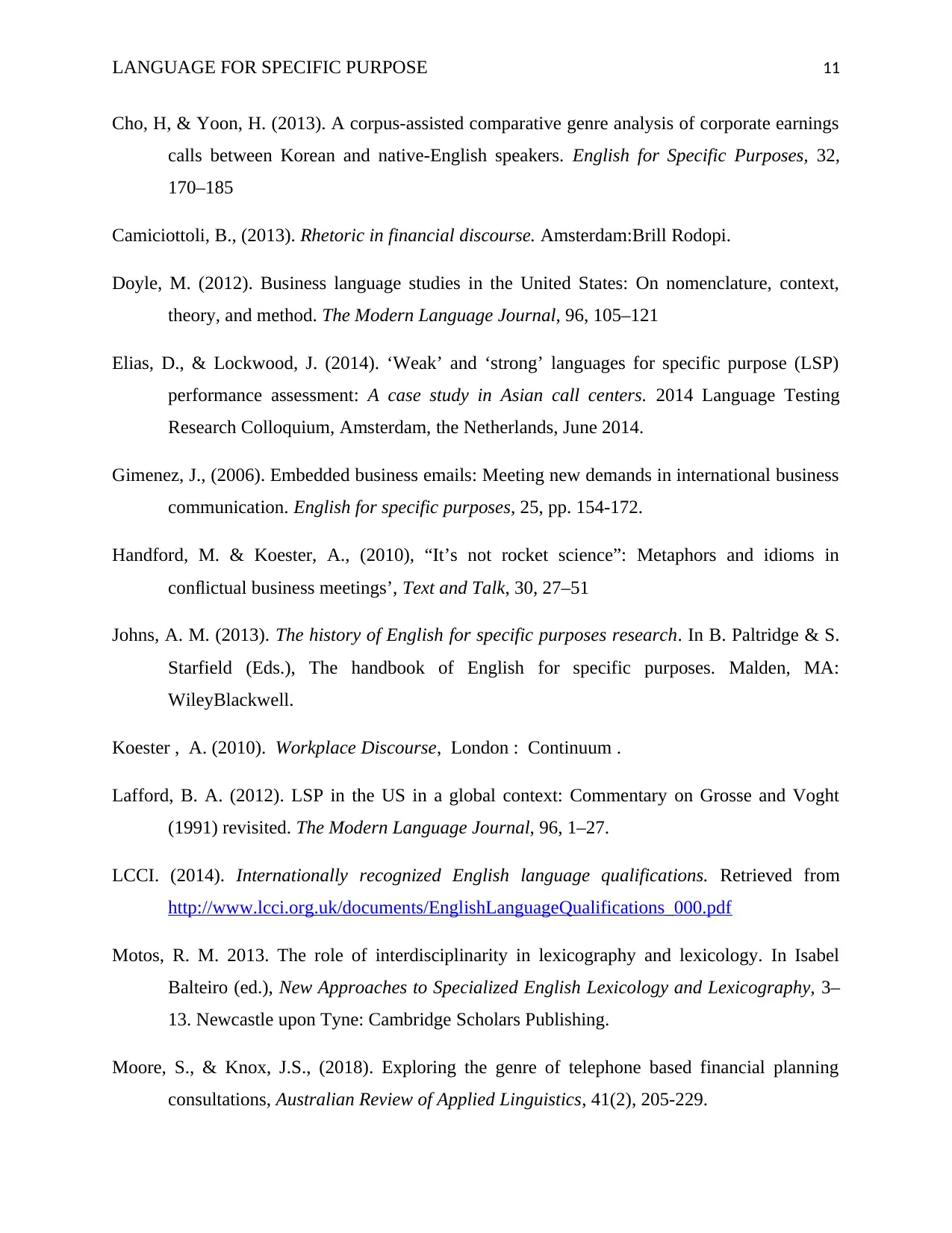
LANGUAGE FOR SPECIFIC PURPOSE 11
Cho, H, & Yoon, H. (2013). A corpus-assisted comparative genre analysis of corporate earnings
calls between Korean and native-English speakers. English for Specific Purposes, 32,
170–185
Camiciottoli, B., (2013). Rhetoric in financial discourse. Amsterdam:Brill Rodopi.
Doyle, M. (2012). Business language studies in the United States: On nomenclature, context,
theory, and method. The Modern Language Journal, 96, 105–121
Elias, D., & Lockwood, J. (2014). ‘Weak’ and ‘strong’ languages for specific purpose (LSP)
performance assessment: A case study in Asian call centers. 2014 Language Testing
Research Colloquium, Amsterdam, the Netherlands, June 2014.
Gimenez, J., (2006). Embedded business emails: Meeting new demands in international business
communication. English for specific purposes, 25, pp. 154-172.
Handford, M. & Koester, A., (2010), “It’s not rocket science”: Metaphors and idioms in
conflictual business meetings’, Text and Talk, 30, 27–51
Johns, A. M. (2013). The history of English for specific purposes research. In B. Paltridge & S.
Starfield (Eds.), The handbook of English for specific purposes. Malden, MA:
WileyBlackwell.
Koester , A. (2010). Workplace Discourse, London : Continuum .
Lafford, B. A. (2012). LSP in the US in a global context: Commentary on Grosse and Voght
(1991) revisited. The Modern Language Journal, 96, 1–27.
LCCI. (2014). Internationally recognized English language qualifications. Retrieved from
http://www.lcci.org.uk/documents/EnglishLanguageQualifications_000.pdf
Motos, R. M. 2013. The role of interdisciplinarity in lexicography and lexicology. In Isabel
Balteiro (ed.), New Approaches to Specialized English Lexicology and Lexicography, 3–
13. Newcastle upon Tyne: Cambridge Scholars Publishing.
Moore, S., & Knox, J.S., (2018). Exploring the genre of telephone based financial planning
consultations, Australian Review of Applied Linguistics, 41(2), 205-229.
Cho, H, & Yoon, H. (2013). A corpus-assisted comparative genre analysis of corporate earnings
calls between Korean and native-English speakers. English for Specific Purposes, 32,
170–185
Camiciottoli, B., (2013). Rhetoric in financial discourse. Amsterdam:Brill Rodopi.
Doyle, M. (2012). Business language studies in the United States: On nomenclature, context,
theory, and method. The Modern Language Journal, 96, 105–121
Elias, D., & Lockwood, J. (2014). ‘Weak’ and ‘strong’ languages for specific purpose (LSP)
performance assessment: A case study in Asian call centers. 2014 Language Testing
Research Colloquium, Amsterdam, the Netherlands, June 2014.
Gimenez, J., (2006). Embedded business emails: Meeting new demands in international business
communication. English for specific purposes, 25, pp. 154-172.
Handford, M. & Koester, A., (2010), “It’s not rocket science”: Metaphors and idioms in
conflictual business meetings’, Text and Talk, 30, 27–51
Johns, A. M. (2013). The history of English for specific purposes research. In B. Paltridge & S.
Starfield (Eds.), The handbook of English for specific purposes. Malden, MA:
WileyBlackwell.
Koester , A. (2010). Workplace Discourse, London : Continuum .
Lafford, B. A. (2012). LSP in the US in a global context: Commentary on Grosse and Voght
(1991) revisited. The Modern Language Journal, 96, 1–27.
LCCI. (2014). Internationally recognized English language qualifications. Retrieved from
http://www.lcci.org.uk/documents/EnglishLanguageQualifications_000.pdf
Motos, R. M. 2013. The role of interdisciplinarity in lexicography and lexicology. In Isabel
Balteiro (ed.), New Approaches to Specialized English Lexicology and Lexicography, 3–
13. Newcastle upon Tyne: Cambridge Scholars Publishing.
Moore, S., & Knox, J.S., (2018). Exploring the genre of telephone based financial planning
consultations, Australian Review of Applied Linguistics, 41(2), 205-229.
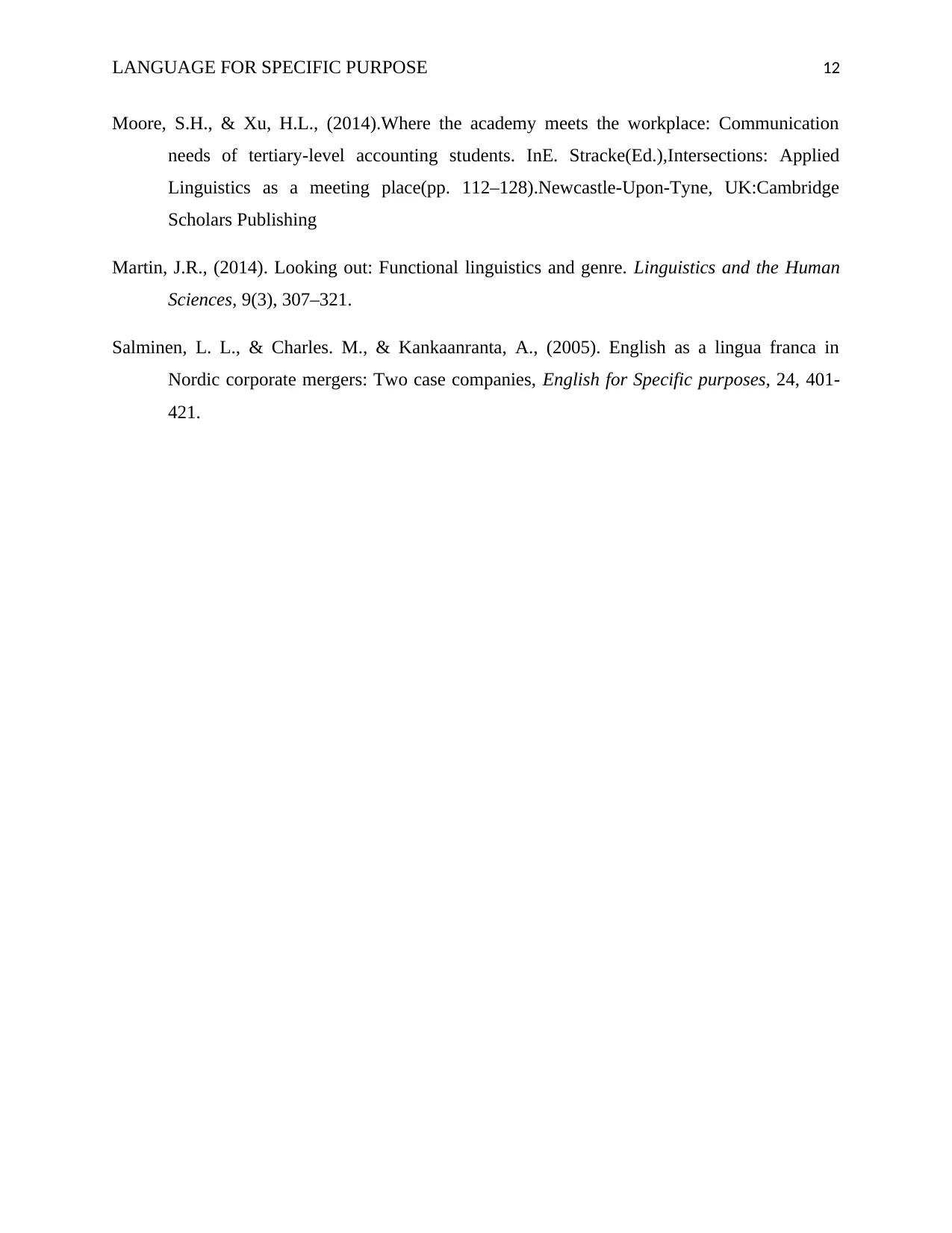
LANGUAGE FOR SPECIFIC PURPOSE 12
Moore, S.H., & Xu, H.L., (2014).Where the academy meets the workplace: Communication
needs of tertiary-level accounting students. InE. Stracke(Ed.),Intersections: Applied
Linguistics as a meeting place(pp. 112–128).Newcastle-Upon-Tyne, UK:Cambridge
Scholars Publishing
Martin, J.R., (2014). Looking out: Functional linguistics and genre. Linguistics and the Human
Sciences, 9(3), 307–321.
Salminen, L. L., & Charles. M., & Kankaanranta, A., (2005). English as a lingua franca in
Nordic corporate mergers: Two case companies, English for Specific purposes, 24, 401-
421.
Moore, S.H., & Xu, H.L., (2014).Where the academy meets the workplace: Communication
needs of tertiary-level accounting students. InE. Stracke(Ed.),Intersections: Applied
Linguistics as a meeting place(pp. 112–128).Newcastle-Upon-Tyne, UK:Cambridge
Scholars Publishing
Martin, J.R., (2014). Looking out: Functional linguistics and genre. Linguistics and the Human
Sciences, 9(3), 307–321.
Salminen, L. L., & Charles. M., & Kankaanranta, A., (2005). English as a lingua franca in
Nordic corporate mergers: Two case companies, English for Specific purposes, 24, 401-
421.
⊘ This is a preview!⊘
Do you want full access?
Subscribe today to unlock all pages.

Trusted by 1+ million students worldwide
1 out of 12
Related Documents
Your All-in-One AI-Powered Toolkit for Academic Success.
+13062052269
info@desklib.com
Available 24*7 on WhatsApp / Email
![[object Object]](/_next/static/media/star-bottom.7253800d.svg)
Unlock your academic potential
Copyright © 2020–2026 A2Z Services. All Rights Reserved. Developed and managed by ZUCOL.



